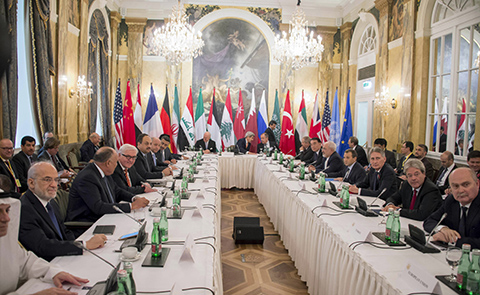 US Secretary of State John Kerry (C L) and Russian Foreign Minister Sergei Lavrov (C R) chat before talks with 17 nations, the European Union and United Nations at the Hotel Imperial on October 30, 2015 in Vienna, Austria. Kerry and other leaders are in Vienna to discuss solutions to the conflict in Syria. AFP PHOTO / JOE KLAMAR
US Secretary of State John Kerry (C L) and Russian Foreign Minister Sergei Lavrov (C R) chat before talks with 17 nations, the European Union and United Nations at the Hotel Imperial on October 30, 2015 in Vienna, Austria. Kerry and other leaders are in Vienna to discuss solutions to the conflict in Syria. AFP PHOTO / JOE KLAMARVIENNA: The United States yesterday announced its first sustained deployment of ground troops to Syria, saying a small special forces team would assist the anti-jihadist fight, as major powers met in Vienna seeking a political solution to the war. The deployment marks an escalation in Washington's efforts to defeat the Islamic State (IS) group, which has tightened its grip on swathes of Syria despite more than a year of US-led air strikes.
Officials said President Barack Obama had authorized an initial deployment of "fewer than 50" special forces to northern Syria - parts of which are controlled by Syrian Kurdish forces fighting IS - easing his long-standing refusal to put boots on the ground. "They will help coordinate local ground forces and coalition efforts to counter ISIL," said a senior administration official, using an acronym for the jihadist group. Washington will also deploy A-10 ground-attack planes and F-15 tactical fighter jets to the Incirlik base in southern Turkey, as part of the ramped up effort.
The announcement came as key backers of Syria's rival sides sought to overcome deep divisions over the conflict, with regime allies Russia and Iran resisting Western and Saudi pressure to force President Bashar Al-Assad from power. Top diplomats from 17 countries, as well as the United Nations and the European Union, gathered in Vienna for talks bringing together all the main outside players in the four-year-old Syrian crisis for the first time. The West and Gulf monarchies led by Saudi Arabia want Assad to step down, but Moscow and Tehran insist he has a right to play a role in an eventual transition towards a mooted unity government and later elections.
France announced late yesterday afternoon that the talks had ended, with major powers to meet again on the crisis in two weeks' time. Russian President Vladimir Putin's spokesman Dmitry Peskov had said earlier that the talks were not about whether Assad should go. "It is not the fate of Bashar Al-Assad that is being discussed," he told reporters in Russia. "Any political settlement is hard to achieve before the forces of terrorism and extremism sustain a significant blow."
Iran's deputy foreign minister Hossein Amir-Abdollahian also strongly denied reports that Tehran was ready to accept a scenario under which Assad would step down within six months, Iranian state television reported. But Iran nevertheless joined the talks for the first time, in a sign of its growing diplomatic clout months after striking a landmark nuclear deal with world powers.
There were some signs of progress in Vienna, with Russia and Saudi Arabia exchanging a list of Syrian opposition groups with which they have contact, Russian deputy foreign minister Mikhail Bogdanov said, quoted by RIA Novosti state news agency. And even getting Iran and Saudi Arabia - the Middle East's foremost Shiite and Sunni powers which back opposing sides in conflicts across the Arab world - to sit at the same table was seen as progress.
US Secretary of State John Kerry sat at the head of the table for the meeting, which also included senior envoys from Russia, China, Turkey, Britain, France, Germany, Italy, Jordan, Iraq, Lebanon, Egypt, Qatar, the UAE and Oman. The Syrian regime and the opposition were not represented at the discussions aimed at ending a war that has claimed a quarter of a million lives.
Saudi Foreign Minister Adel Al-Jubeir - whose kingdom supports anti-regime rebels - was sat almost as far from his Iranian counterpart Mohammad Javad Zarif as was possible at the tight U-shaped table in a conference room of Vienna's Imperial Hotel. Kerry, while warning against expectations of an immediate solution, had said he was hopeful about the talks. "I don't call it optimism. I am hopeful that we can find a way forward. It is very difficult," he said ahead of the main meeting.
Russia, which has waged a month of intense air strikes against Assad's armed opponents, has urged preparations for parliamentary and presidential elections in Syria. But the idea has been rejected by rebels who say a vote would be impossible in the current circumstances, with millions of Syrians displaced, cities standing in ruins and two-thirds of the country in the hands of jihadists and other armed groups. - Agencies










